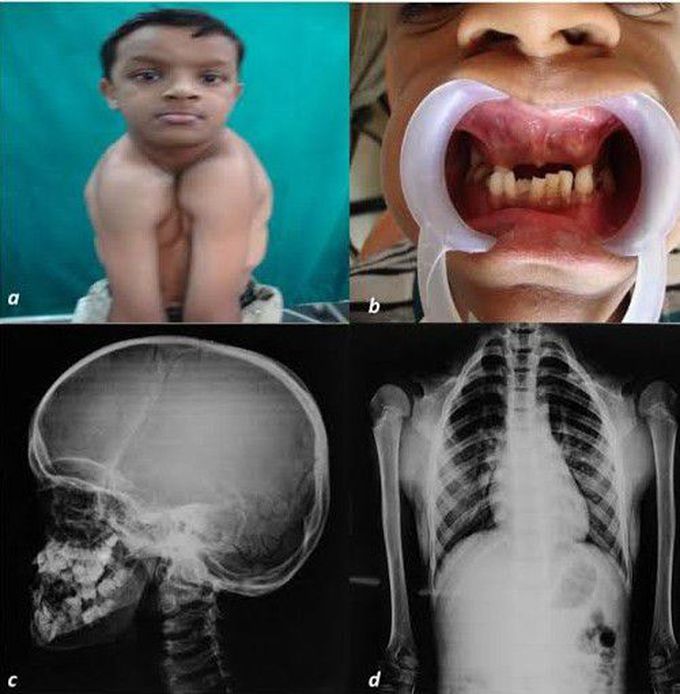


Cleidocranial dysplasia
Cleidocranial dysostosis (CCD), also called cleidocranial dysplasia is a rare autosomal dominant condition with generalized dysplasia of bone.It is characterized by delayed closure of cranial sutures, distinctive facial features , sloping shoulders caused due to defective or absent clavicles, short stature, dental abnormalities and a variety of other skeletal abnormalities. Signs & Symptoms The most prominent feature of cleidocranial dysplasia is a delayed closure of Fontanels and sutures of the skull. Other features include: >prominent foreheadand wide face, >tapered fingers, flat feet, knee knock >maxillary hypoplasia and failure of the mandibular bones to unite >narrow drooping shoulders caused by complete or partial absence of collarbones (clavicles) >scoliosis (curvature of the spine) >wide pelvic joint and delayed growth of the pubic bone > small shoulder blade, Dental abnormalities may include: >delayed tooth eruption >Hypodontia or Anodontia >Enamel hypoplasia (underdeveloped enamel) >Hyperdontia >Cysts formation around the unerupted or displaced teeth in some cases. > A high-arch or cleft palate may be present Individuals with cleidocranial dysplasia have an increased risk for recurrent ear and sinus infections, upper respiratory complications and hearing loss. CAUSES: Cleidocranial dysplasia is usually caused by mutations in the RUNX2 gene. This gene instructs to make proteins involved in the development and maintenance of teeth, bones, and cartilages. It is passed on by an autosomal dominant pattern. DIAGNOSIS : Cleidocranial dysplasia (CCD) is diagnosed on the basis of symptoms, a clinical exam, imaging studies like a complete skeletal survey and the genetic testing for RUNX2 gene. TREATMENT: Treatment of cleidocranial dysplasia (CCD) is focused on managing the symptoms. Patients with CCD may undergo multiple orthopaedic, facial reconstructive and dental procedures to improve their comfort, function and well-being. Credits: https://images.app.goo.gl/mRDTnXkJGybC5L5D6 https://rarediseases.org/rare-diseases/cleidocranial-dysplasia/

